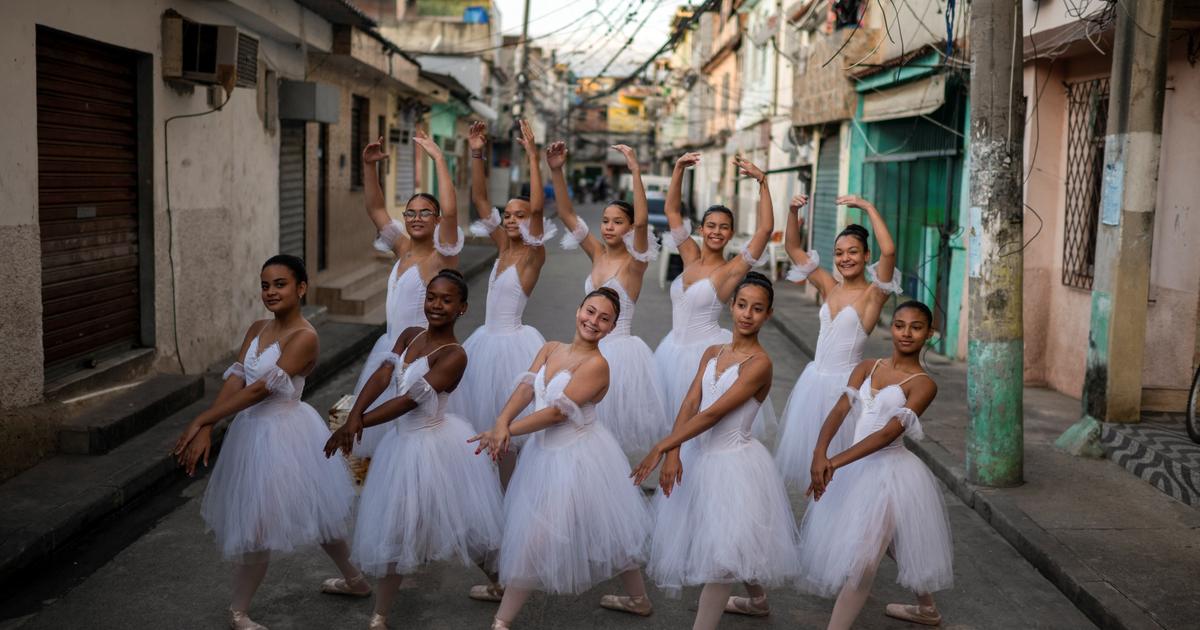“I don't know what I would do without ballet. Here, it's like a second home
,” says Vitoria Gomes de Carvalho, a 16-year-old Brazilian who fears the closure of the classical dance school she attends in a favela in Rio de Janeiro, threatened by financial difficulties.
Through her wide-rimmed glasses, a gleam of concern appears in her eyes, as she stretches her leg on the bar in front of the large mirror.
Like her, 410 students aged 6 to 29 in dark red leotards are taking free dance lessons in Manguinhos, a favela north of Rio, and 700 are on the waiting list.
In this neighborhood which lives under the yoke of drug trafficking gangs and where classes are regularly interrupted by shootings during police operations, the Ballet Manguinhos association, which has existed for ten years, is a kind of oasis.
“In the favela, seeing teenagers pregnant or already mothers of several children is practically the norm. For our students, the pregnancy rate is only 1%,”
Carine Lopes, 32, president of the association, told AFP.
But the sustainability of this reference institution is threatened.
The pandemic has left its mark, with the tragic death of the founder of the association Daiana Ferreira in January 2021 as a result of Covid-19.
Read alsoBrazil: crowd baths for Lula and Bolsonaro 3 months before the presidential election
A few months later, another hard blow: the three-year funding contract with the American philanthropic foundation The Secular Society (TSS) ended as planned and the Ballet Manguinhos has still not found another source of income to the height.
A sponsorship system
"With the global crisis we are currently experiencing, it is increasingly difficult to find partners willing to support an institution like ours
," laments Carine Lopes.
Funding from TSS allowed the association to become the owner of the premises, a 600 m2 building on four floors at the entrance of the favela, but maintenance costs remain high, with electricity bills and local taxes , not including staff costs.
“With TSS, we had a contribution of 45,000 reais per month (about 8,300 euros). Today, we have to make do with barely 10,000 reais. If it continues like this, we will only be able to maintain our activities until the end of the year”
, warns the president of the association which has fifteen employees, including teachers.
Faced with difficulties in finding sponsors or obtaining public subsidies, the Ballet Manguinhos launched a sponsorship campaign at the beginning of the year entitled
“Adopt a dancer”
.
Each sponsor undertakes to pay at least 90 reais (approximately 16 euros) every month, the estimated cost for each of the students, between the remuneration of the teachers and the purchase of equipment, in particular dance shoes which must be changed regularly.
To last over the long term, the association needs 1,000 sponsors.
Here I can distract my mind from bad things.
Young school dancer
“Dancing has helped me a lot. I suffered from depression for two years, I attempted suicide, but here I learned to express myself, to bring out my feelings and to know myself better
,” says Vitoria Gomes de Carvalho.
Ballet Manguinhos also helped 15-year-old Ana Julia Martins through a difficult time.
“In recent years, she lost her great-grandfather and her father went to prison.
The Ballet saved her.
While dancing, she remained focused and did not go out of the way
,” explains Rosilene Sousa da Silva, her mother.
Read alsoBrazil: a militant ballet in a favela in the midst of a pandemic
“Dancing gave her confidence. His grades improved at school. Before, Ana Julia thought she wouldn't get anywhere because she's black
," she insists, adding that her daughter and other Ballet Manguinhos students received psychological support during the pandemic.
“Here I can distract my mind from bad things
,” says the graceful, smiling girl with her hair tied in a bun, who started lessons at the age of six and dreams of becoming a professional dancer.
“Our mission is above all to train citizens. Some students pursue a career in dance, but it is also gratifying to learn that others have entered university
,” concludes Carine Lopes.

